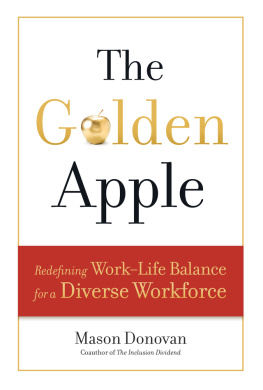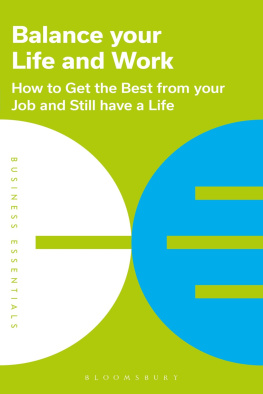Donovans approach to achieving personal and worklife presence really hit home for me as a busy working mom. He provides excellent advice on how to promote this in your company culture so you and your employees benefit.
JENNIFER WILGA, chief revenue officer, MediaRadar
Mason Donovan concisely illustrates why its important for individuals and businesses to incorporate mindfulness and intention into the worklife balance process, and how clarifying your purpose can ignite effective change. His highly actionable ideas tap into ways to help companies build and sustain inclusive and healthy worklife cultures.
CHRISTINE KOH, author, speaker, and lifestyle expert
The invasion of our work life into the space of our personal lives (and the inverse) is as ubiquitous as music, Donovans pervasive metaphor in The Golden Apple . Donovan takes on this invasion in an enlightening and engaging style through the use of distinguished research, corporate case studies, and personal illustrations. Organizational leaders and managers are provided strategically viable solutions to the current dilemma of permeable and distracting boundaries between work life and personal life, and their interplay with diversity and inclusion.
TIM HARPER, PhD, Skidmore College
The Golden Apple
The Golden Apple
Redefining WorkLife Balance
for a Diverse Culture
Mason Donovan
First published by Bibliomotion, Inc.
711 Third Avenue, New York, NY 10017, USA
2 Park Square, Milton Park, Abingdon, Oxon OX14 4RN, UK
Bibliomotion is an imprint of the Taylor & Francis Group, an informa business
Copyright 2016 by Mason Donovan
All rights reserved. No part of this publication may be reproduced in any manner whatsoever without written permission from the publisher, except in the case of brief quotations embodied in critical articles or reviews.
ISBN-13: 978-1-62956-114-1 (hbk)
CIP data has been applied for.
Dedicated to my dear friend Asha Marina Brouwer. Life is simply better and more balanced with you in it.
It is not uncommon to hear a CEO or business leader give a speech to the team and say, We are a People First organization, and people are our number-one asset. It is the politically correct thing to say and is generally widely accepted. This declaration will usually bring a round of respectful clapping from the team, and the leader and the leadership team will give one another approving nods and smiles, having confidence that they have checked the box to be a People First organization. See, we value people, they think... but do they really?
The proclamation that people are our first asset is not a true reflection of a People First organization. People are not an asset! They live, they breathe, they are emotional, they think, and they feel whether their leaders truly value them, rather than just accepting what the leadership team says about them. They have lives in and out of the office, lives that require balance to reach their fullest potential. Brands, operational capabilities, physical toolsthese are the assets of the organization. People are much more. They are the heart and soul of the company! They are the brains, the passion, and the will of the company! The people contribute the unique characteristics of your organization, and they are what makes it work or not, what makes the business sustainable or not! These unique attributes must be embraced and celebrated. For without highly passionate, committed, purposeful, and soulful people, the company itself will cease to exist.
In my experience, the only successful way to build and sustainor transforma business is to engage and empower purposeful people by motivating their heads and inspiring their hearts. Understanding what truly moves and inspires your team, as individuals and as team members, and aligning them with the companys purpose is vital to achieving this ambition of a company that acts from both head and heart. What are the unique talents of your teams and their members? Do you recognize, appreciate, and embrace their uniqueness? Do you and your leadership team truly dedicate your time to knowing and listening to your team, whether business is good or bad? Do people really come first? They must; and we must go way beyond just saying it, to achieve a motivated, dedicated, and inspired head and heart organization. Our partnership with the Dagoba Group directly connects to this head and heart philosophy.
Each person in your company brings unique talents, thoughts, and passions to your team and organization. Embracing, appreciating, and respecting these unique characteristics are essential to attracting, building, and growing a diverse, empowered team. Even though you may not fully understand each colleagues uniqueness, you need to embrace and respect all employees in your organization. Doing so requires that many of the executives show strong leadership. The ability to genuinely listen and engage people are near the top of the list of traits leaders must have. Leaders must be dedicated to proximity and availability, and must show a willingness to give of themselves to serve the team and its members. Also, they need to have an unwavering commitment to building trust and forming genuine, authentic, trusted relationships. When presented with people challenges such as worklife balance, we must seek out inclusive solutions that value our uniqueness while also embracing our shared goals.
So how do we build trust? Trust is not built with a great speech delivered from a podium! Trust is not something you can just ask for and receive! Trust is earned through everyday actions, both big and small. Trust is earned by genuinely caring, giving of oneself, and listening to what people are truly passionate about... their purpose. When you have this type of consistent approach and a relationship built on mutual trust, which truly takes time to build and is far harder to build than to break down, you will be embracing and elevating your teams uniqueness and be building a diverse team. Why? Because people are respected and appreciated for who they are and not simply as assets.
There are many critical factors that will help you build trusting relationships with a diverse and inclusive team. Here are some of those traits:
1. Authenticity . No leader is perfect or without bad moments or emotions. We are all human. Yet a leader who is true to his or her values and beliefs can be trusted. Self-awareness and humility become great guides that can help us through our journey. If leaders can look themselves in the mirror each and every day, and say, I did what was best for the team, no matter the difficulty, they have remained true to their values and are genuine.
2. Recognition of both the privilege and the responsibility that a leadership role affords. Having the opportunity to lead others in any capacity is a tremendous privilege, which allows us to make an impact, good or bad, on other peoples lives. How many times have you heard someone complain about his boss: He doesnt know what he is doing, She doesnt listen to me, or He doesnt understand or respect me? These sentiments are made because most leaders (bosses, as they see themselves) dont understand the flip side of their privilege, which is the responsibility to lead: the responsibility to set an example, and to give respect as they themselves want to be respected. Leaders have the opportunity to set an example by embracing diversity and including everyone. This is both a great privilege and a responsibility.








